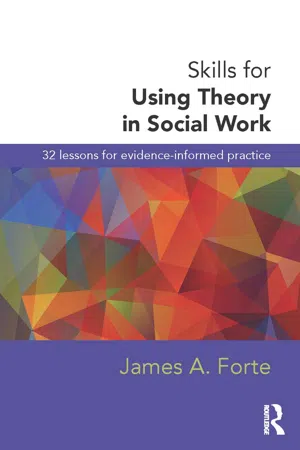
Skills for Using Theory in Social Work
32 Lessons for Evidence-Informed Practice
- 344 pages
- English
- ePUB (mobile friendly)
- Available on iOS & Android
About This Book
Using theory, research evidence and experiential knowledge is a critical component of good social work. This unique text is designed to help social work students and practitioners to integrate theorizing into practice, demonstrating how to search for, select and translate academic knowledge for practical use in helping people improve their lives and environments.
Presenting 32 core skills, Skills for Using Theory in Social Work provides a conceptual foundation, a vocabulary, and a set of skills to aid competent social work theorizing. Each chapter outlines the knowledge and action components of the skill and its relationship to core practice behaviours, along with learning and reflection activities. The lessons are divided into four parts:
- Section one discusses foundational material, including self-identification as a theorist-practitioner, the deliberate use of the term theory, and a social work approach to the selection of knowledge.
- Section two focuses on the adept use of theorizing skills. It covers identifying assumptions, using concepts, formulating propositions, organizing theory elements inductively or deductively, summarizing and displaying the elements of a theory, gathering and organizing assessment information and communicating with clients and colleagues about tentative theories.
- Section three includes lessons preparing social workers for the construction of useful middle-range theories including causal theories and interpretive theories and for testing and sharing these practical theories.
- Section four presents skills to develop critical thinking about theoretical knowledge. These include avoiding the misuse of theory, judging a theory using scientific standards, judging a theory by professional standards, critiquing theory in its cultural and historical context and making judgments about the likely long-term impact of a theory.
This key text will help readers to demonstrate their expertise in reflective, competent, and theory-informed practice. It is suitable for all social work students and practitioners, particularly those taking practice, theory and human behaviour in the social environment courses.
Frequently asked questions
Information
SECTION 1 Theorizing basics
LESSON 1 Identify and act as theorist engaged in theoretical thinking (EPAS 2.1.1 Identify as a Professional Social Worker; EPAS 2.1.3 Apply Critical Thinking; EPAS 2.1.5 Engage in Research-Informed Practice; EPAS 2.1.7 Apply Knowledge)
Professional social work and the role of theorist
recognized as aiding the social worker in focusing more systematically on essential factors or variables, in expanding the scope of his perspectives, in explaining underlying causal dynamics, in providing leads for practice strategies, and in formulating predictive statements about the probable outcomes of various treatment modalities, (p. 5)
Knowledge, skill, and attitudes for effective theorizing
Knowledge
Skills
Everyday Thinking | Practical Theorizing |
To act | To understand and reflect on action |
Automatic or voluntary | Voluntary and purposeful |
One level — thought and aim | Two levels — thought (concept use) and aim with critical/reflective reasoning about concept use |
Guided by social meanings | Guided by scientific and social meanings |
Immersed in experienced situation | Alternate distancing and immersion |
Influences and changes events, objects, people | Influences and changes events, objects, people and theories |
Judged by result of action | Judged by coherence, consistency and results of theorizing acts |
Table of contents
- Cover Page
- Half Title Page
- Title Page
- Copyright Page
- Dedication
- Contents
- List of figures
- List of tables
- Foreword
- Introduction
- Section 1 Theorizing basics
- Section 2 Applying theory (deconstructive and reconstructive theorizing)
- Section 3 Constructing practical theories
- Section 4 Critical thinking about theoretical knowledge using scientific, practical, and professional standards
- Section 5 Conclusion
- Index